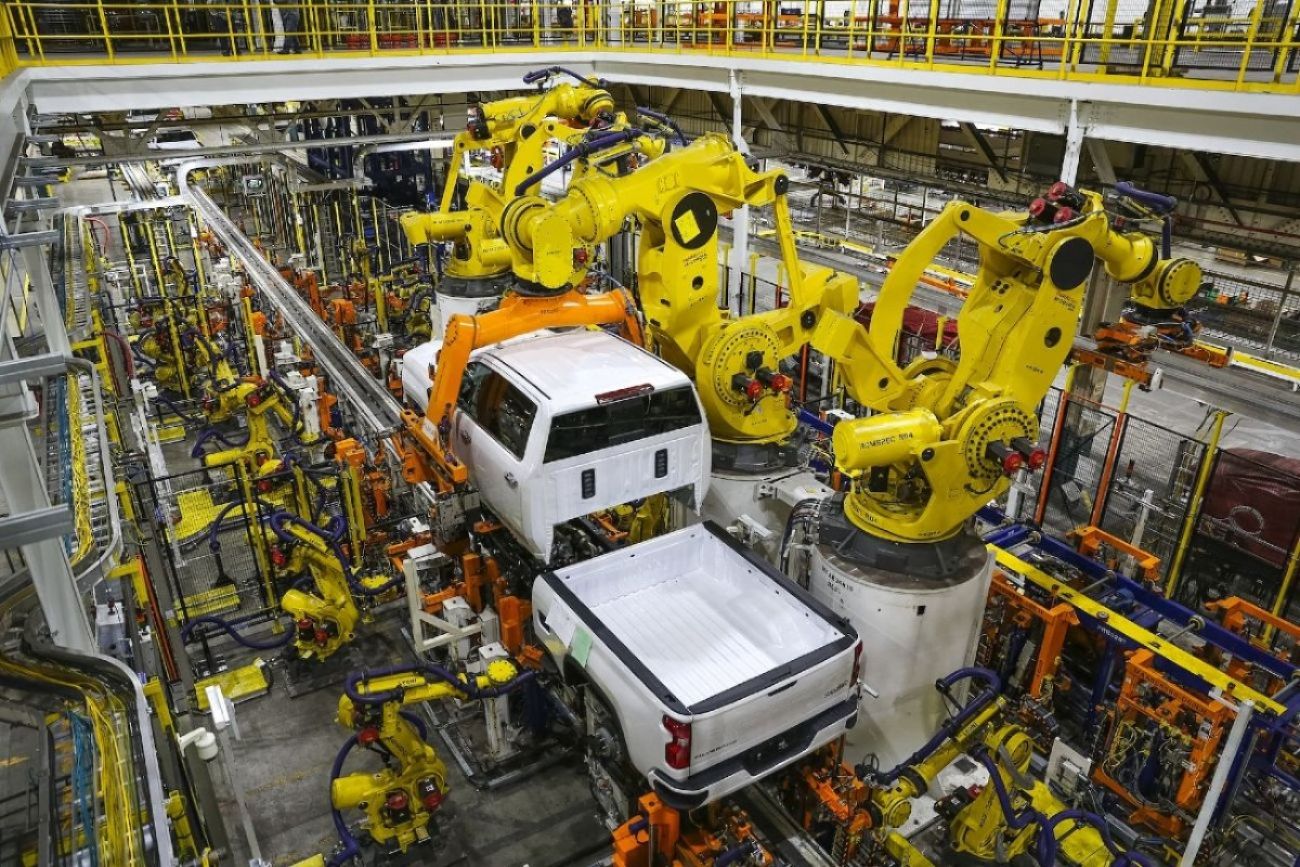Trump tariffs jolt Michigan: businesses eye cuts; shoppers tighten belts

- Days after President Donald Trump imposed new tariffs on imports from dozens of countries, Michigan is feeling the fallout
- While automakers trimmed their workforce and shuffled manufacturing footprints, small businesses were pondering how to absorb increases in the price of goods
- Trump vowed more tariffs could be coming, and asked the public to ‘hang tough’
When Chris Bennett heard President Donald Trump was imposing across-the-board tariffs on foreign imports, he expected price increases on the ink, paper and other supplies he uses in his Dearborn printshop.
But Bennett didn’t expect it to happen so quickly.
Trump on Wednesday announced sweeping "reciprocal" tariffs, levying near-universal 10% taxes on foreign imports that took effect Saturday and promising even higher taxes on goods from China, Japan, the European Union and other nations starting April 9. That’s in addition to 25% tariffs on finished vehicles and key parts, which ramped up ongoing tensions between the US, Canada and Mexico.
By Friday afternoon, suppliers were notifying Bennett of a 24% price increase on the Epson ink cartridges, paper and printers used in his shop.
The company, based in Japan, was passing on all costs from the new tariff Trump had proposed just days before.
“So many people think it’ll just be Ford and the big corporations that will get hit with these price increases,” said Bennett, whose Image Works shop specializes in archival-quality printing for photos and art.
“I knew prices would go up for me. But 24% so quickly, within two or three days? That was pretty shocking.”

The president has argued international trade policies have disadvantaged US workers for decades and claims the sweeping tariffs will boost the nation’s manufacturing base and raise funds for lowering taxes and reducing the national deficit.
In recent posts on social media, Trump said countries are already reaching out to negotiate on trade — including Japan — and expressed confidence the strategy would be a net positive for the US.
On Monday, he proposed even higher tariffs on China in response to the country’s planned retaliatory tariffs, threatening a total 104% tax on Chinese exports to the US if government officials don’t cooperate.
“THIS IS AN ECONOMIC REVOLUTION, AND WE WILL WIN,” Trump wrote. “HANG TOUGH, it won’t be easy, but the end result will be historic.”
Stock markets have so far responded negatively to those pronouncements, with sharp drops cutting into 401k retirement accounts and other investments held by Michiganders and other Americans.
Michigan’s 15 largest public companies lost a collective $11 billion since Wednesday — the day before Trump announced reciprocal tariffs.
The market capitalization for the companies — including Stryker, General Motors, Ford Motor Co. and Whirlpool — dropped from $402 billion to $391 billion.
The loss represents a 3% decline, steeper than the overall index losses of about 1% for the Dow Jones Industrial Average and the S&P 500.
But outside a grocery store in Lansing, some Michiganders loading bags into their cars said they’re willing to endure the shocks — at least temporarily — if the outcomes are what Trump promised.
“There are a lot of fear-mongerers out there,” said Mary Thomas, 70, of East Lansing, who supports the tariffs while acknowledging that slumping stocks and rising prices have caused her to be more careful about spending.
“We have been taken advantage of (by other countries) for many, many years,” she said.
An uncertain future
Heading into 2025, Michigan’s economic outlook was positive, with moderate employment growth, rising personal incomes and growing tax revenues.
Trump’s tariff strategy has the potential to reverse that trajectory — at least in the short-term — economists told Bridge Michigan, especially if tariffs on imported materials drive up production costs in the state’s key industries and retaliatory tariffs from other countries cut into export sales.
In the stock market, the biggest losers among companies headquartered in Michigan were chemical maker Dow (down 21% since Wednesday), Ally Financial, the auto loan lender (-15.2%), home products manufacturer Masco (-14.1%) and auto suppliers Lear (-11.6%) and BorgWarner (-11.5%).
Among the state’s leading companies, only Rocket Companies — which has been acquiring competitors over the past few weeks — gained, closing at $14.62 per share, up 77 cents.
GM lost the most value as of Monday, dropping $3.78 billion from its $47.74 market capitalization before reciprocal tariffs were announced. The company’s stock closed at $43.52 on Monday.
Ford lost $1.36 billion in value on Monday from the previous week, when it was valued at $38.1 billion. The Dearborn-based automaker’s stock closed at $9.62, down from $10.15 five days earlier.
For the state’s auto industry, where certain import protections could benefit Michigan companies in domestic sales, retaliatory action and increased production costs could continue to have a dramatic impact.
“This scale of a tariff shock is going to hurt car sales, and it's going to cost us jobs,” said Patrick Anderson of the Anderson Economic Group in East Lansing, which predicts auto import tariffs could drive up costs an additional $2,500 to $5,000 for lower-priced US vehicles and up to $20,000 for some imported models.
“You impose this size of costs on American consumers, they will buy fewer cars, and most of the cars they buy are built in America or built nearby with American parts,” Anderson continued. “There's no way around it.”
RELATED:
- Tariff timeline: Trump’s trade actions and how they impact Michigan
- Trump announces sweeping new tariffs: What they mean for Michigan
- Trump announces new auto tariffs; what it means for Michigan
Economists at the University of Michigan recently predicted steel and aluminum tariffs will cost the state about 2,300 payroll jobs by 2026 — but their report was based on an assumption that "long-lasting, broad-based tariffs on Mexico and Canada will be avoided."
Gabriel Ehrlich, an economic forecaster at the University of Michigan, said that impact is “pretty unambiguous” because local manufacturers use imported steel and aluminum, and there’s not currently enough domestic producers to make up the difference without significant cost hikes.
Other industries get significantly more complicated, especially considering many countries are actively negotiating with the US government on tariffs, Ehrlich said. Assuming the US moves ahead with its current tariff strategy and that foreign nations respond in kind, Michigan consumers and industries are likely looking at a “net negative” impact, he added.
The state’s projected sales tax revenue could also drop, Ehrlich said, because increased costs of imports “does reduce the money people have to spend on goods and services… people's pocketbooks will feel it.”
‘Level playing field’ or ‘ping pong ball?’
The new tariffs have already prompted action from Michigan-based automakers, including Stellantis’ announcement that it would temporarily lay off 900 workers in Michigan and Indiana and pause production in one plant apiece in Canada and Mexico.
GM reportedly plans to boost production of trucks in Fort Wayne, Ind. in response to Trump’s tariff strategy. Nissan, a Japanese automaker, is reversing plans to scale back SUV production in Tennessee.
Ford launched a marketing campaign in response to the tariffs, highlighting the company’s commitment to building cars in the US and extending employee discount rates to all new car buyers.
On Trump’s auto tariffs specifically, the United Auto Workers union has been a vocal supporter, arguing that automakers have the money and capacity to handle the changes.
Jason Wade, assistant to UAW President Shawn Fain, told reporters in a recent press call with US Rep. Debbie Dingell that their strong critique of free trade isn’t new, and that the goal is to see “the promises of free trade to match up with the reality of how they’re executed.”
“We are supportive of changing the system, but that doesn't mean we're supportive of everything that (Trump is) doing,” Wade said.
Dingell, a Dearborn Democrat, said the administration’s other, back-and-forth upheavals to economic trade policy and wide-ranging tariffs on key trading partners doesn’t accomplish that goal.
“I want to work with the Trump administration on smart, strategic trade policy that will onshore American jobs,” she told reporters. “Chaos and being a ping-pong ball isn't going to do that.”
US Rep. Lisa McClain, a Macomb County Republican and longtime Trump ally, said the president’s strategy is working and is bringing foreign trading partners to the negotiating table.
“We will no longer put American workers at an unfair disadvantage,” McClain said in a statement last week. “The goal is to get to a level playing field.”
‘Threads start to unravel’
The impact is trickling down from big businesses that manufacture and import goods to small businesses that buy their products.
Take bicycles, for example, many of which are made in places like Taiwan, Cambodia and Vietnam. Each of those countries was included on Trump’s list of countries set to face higher reciprocal tariffs than the baseline 10%.
“We are waiting for brands to communicate what that means,” said Geoff Kuyper, sales manager at West Michigan Bike & Fitness in Kentwood. “It will 100% be brands saying, ‘This is what we need to do in response to tariffs,’ and we will say OK and probably just be along for the ride.”
A March 2025 quarterly analysis conducted by the Small Business Association of Michigan found 53% of the state’s small business owners view tariffs as a threat to their local business. Another 34% viewed tariffs as irrelevant to their operations, while 13% of respondents believe federal trade policy changes could present positive opportunities for their business.
In Ludington, the owner of a local game shop took to Facebook to break down the impact on small businesses.
“This is, believe it or not, not directly a political post,” said Nate Petersen, owner of Backstage Hobbies & Games.
As tariffs raise the price of goods, businesses typically absorb the hit by raising prices, and consumers may respond by buying less. Petersen predicted board games will be cut out of budgets before necessities like groceries.
“We celebrate 18 years of business, two successful locations, two families with two mortgages and stakes in our community, and a network of people we support,” Petersen wrote. “Pluck this string and a number of other threads start to unravel, and that's true of any one of us.”
Bennett, the Dearborn print shop owner, said his small business already operates on “razor thin margins.” Now, monthly expenses have suddenly increased by up to hundreds of dollars.
He’s bracing for more impact as other suppliers react to the tariffs, while wondering how long he can absorb the cost increases before he’s forced to pass it onto customers.
“A lot of our customers who are working artists, you know, they already struggle with the cost of making prints of their artwork,” Bennett said.
His biggest fear, he said, is that even if Trump walks back his trade policies, “once these prices go up… they're not going to go back down.”
Business reporter Paula Gardner contributed to this story.
Business Watch
Covering the intersection of business and policy, and informing Michigan employers and workers on the long road back from coronavirus.
- About Business Watch
- Subscribe
- Share tips and questions with Bridge Business Editor Paula Gardner
Thanks to our Business Watch sponsors.
Support Bridge's nonprofit civic journalism. Donate today.
See what new members are saying about why they donated to Bridge Michigan:
- “In order for this information to be accurate and unbiased it must be underwritten by its readers, not by special interests.” - Larry S.
- “Not many other media sources report on the topics Bridge does.” - Susan B.
- “Your journalism is outstanding and rare these days.” - Mark S.
If you want to ensure the future of nonpartisan, nonprofit Michigan journalism, please become a member today. You, too, will be asked why you donated and maybe we'll feature your quote next time!




